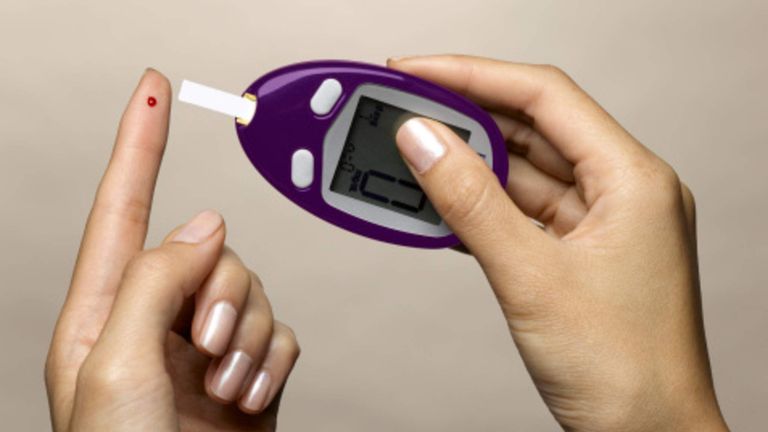New insulin pill could end daily injections for diabetes patients
Researchers from Massachusetts Institute of Technology have developed a capsule strong enough to survive stomach acid.
Wednesday 9 October 2019 11:00, UK
A revolutionary insulin pill could prevent the millions of people living with type 1 diabetes from taking daily injections, researchers have said.
Scientists from Massachusetts Institute of Technology have developed a capsule strong enough to survive the journey through the gastrointestinal tract.
When the pill is ingested and reaches the small intestine, it breaks down into dissolving microneedles that attach to the intestinal wall, releasing the drug into the bloodstream.
Previous attempts to give patients insulin in pill form have failed because they cannot withstand stomach acid and release the hormone too early.
In tests in pigs, the 1.18in (30mm) capsule, loaded with the same amount of insulin as an injection, was able to deliver insulin to the bloodstream just as fast.
"We designed the arms such that they maintained sufficient strength to deliver the insulin microneedles to the small intestine wall, while still dissolving within several hours to prevent obstruction of the gastrointestinal tract," lead author Professor Ester Caffarel-Salvador said.
The pill is coated with a polymer that can survive the highly acidic environment of the stomach before reaching the small intestine where it needs to dissolve.
The protective layer, which is designed to dissolve at a pH greater than 5.5, will then break away and the capsule will unfold into a triangle shape with three arms.
Each arm is coated with several 1mm-long needles which pump the drug directly into the bloodstream after latching onto the intestinal wall, beginning the process of lowering blood sugar levels.
"A lot of this work is motivated by the recognition that both patients and health care providers prefer the oral route of administration over the injectable one," said senior co-author and gastroenterologist Dr Giovanni Traverso.
The new capsule could represent an important step toward achieving oral delivery of protein drugs, which has been a huge challenge for decades.
Professor Robert Langer, senior author of the paper, from MIT said: "We are really pleased with the latest results of the new oral delivery device."
He said that the research team "look forward to hopefully seeing it help people with diabetes and others in the future".
People with type 1 diabetes cannot produce enough insulin, which controls blood glucose. This causes the level of glucose to become too high, resulting in them needing daily injections of insulin to keep blood sugar levels under control.
Those with type 2 diabetes - which is linked to obesity and inactivity - are not typically prescribed insulin because their bodies are able to naturally produce it.





